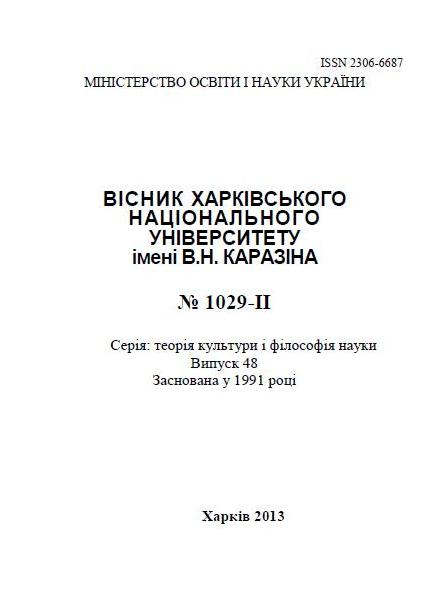МУЗЫКАЛЬНАЯ ОНТОЛОГИЯ Ф. НИЦШЕ И ПОНЯТИЕ «ВРЕМЯ»
Abstract
Статья посвящена музыкальной онтологической концепции Ф. Ницше и понятию
«времени», через которое можно выразить суть его взглядов на онтологию музыки. В
настоящей работе дается определение и анализ двух ключевых понятий
натуралистической онтологии Ницше – «диониссийское и аполлоническое». Эти две
категории истолковываются как оппозиция Бытия и Становления, где «аполлоническое»
есть статическое бытие и постоянство, а «диониссийское» – динамическое
становление, развертывание и изменение. На основании музыкальной онтологии Ницше в
данной статье отождествляется понятие становления с понятием времени, что в
перспективе может позволить построить еще одну концепцию времени.
Шапченко Т. В. МУЗИЧНА ОНТОЛОГІЯ Ф. НІЦШЕ ТА ПОНЯТТЯ «ЧАСУ»
Стаття присвячена музичній онтологічній концепції Ф. Ніцше і поняттю «часу», через
яке можна висловити суть його поглядів на онтологію музики. В даній роботі дається
визначення і аналіз двох ключових понять натуралістичної онтології Ніцше –
«діонісійське і аполлонічне». Ці дві категорії тлумачаться як опозиція Буття і
Становлення, де «аполлонічне» є статичне буття і сталість, а «діонісійське» –
динамічне становлення, розгортання і зміна. На підставі музичної онтології Ніцше в
даній статті ототожнюється поняття становлення з поняттям часу, що в
перспективі може дозволити побудувати ще одну концепцію часу поряд з вже існуючими.
Ключові слова: онтологія, музика, час, становлення, «діонісйське і аполлонічне»,
розгортання., сенс.
Shapchenko T.V. MUSICAL ONTOLOGY OF F. NIETZSCHE AND THE NOTION OF
«TIME» The art of music takes a special place in the life of every individual and in the history of
human civilization on the whole. Music as a form of art brings forth numerous philosophical
disputes and speculations – what music is, what the ontological nature of various musical
genres, styles and compositions is, philosophical value and epistemological meaning of musical
artifacts, search for the sense of music and the role of individual musical experience.
F. Nietzsche, the German philosopher and representative of irrationalism, made a
significant contribution in the ontology of music. Nietzsche’s ontological concept and the notion
of “time”, whereby the main points of his views on the ontology of music can be expressed, are
considered in this article. A definition and analysis of the two key notions of Nietzsche’s
naturalistic ontology – “Dionysian” and “Apollonian” are offered in this work. These two
categories are interpreted as the opposition of Being and Becoming, where “Apollonian” is
static being and “Dionysian” is dynamic becoming, development and reformation. The symbolic
images of Apollo and Dionysus embody fundamental image spheres of the Antique culture.
Nietzsche gives preference to “Dionysian” principle as to the embodiment of the ontological
notion of Becoming. He states that ‘“dionysism” is a more absolute “spirit of music” and it is
more relevant to the essence of music, which implies dynamics, evolution, reformation,
movement, harmonic and rhythmic abundance. Following this interpretation of music as
becoming, it can be seen as a temporal category and a universal language, which is used to
describe all dynamical processes of objective and subjective reality.
It stands to reason that this description is figurative and symbolic, but not conceptual and
logical. However, the fundamental issue in this work is that on the basis of Nietzsche’s musical
ontology, the notion of becoming is identified with the notion of time, which in perspective can
enable us construct another concept of time alongside with the existing already concepts
(physical time, subjective psychological time, biological, social etc.) – the concept of musical
time. In this hypothetical concept time, first of all, is a successive development of musical senses
and symbols in the form of a sound flow, which is a developing musical event, a process of
becoming in the process of perception and comprehension.
As in all other concepts, in this one time is continual; it doesn’t have any gaps or discrete
parts. Musical time can be analyzed as an interlink between the concepts of natural time
(physical, biological) and the concept of subjective psychological time, as temporal
comprehension of musical events is expressed in physical sound effects and can be realized only
in the subjectivism of human mentality. A similarity between the “Dionysian” principle of
Nietzsche’s musical ontology and images of modern electronic music can be noticed in the
modern specialized literature,
Key words: ontology, music, time, becoming, Dionysian and Apollonian, development,
sense.




